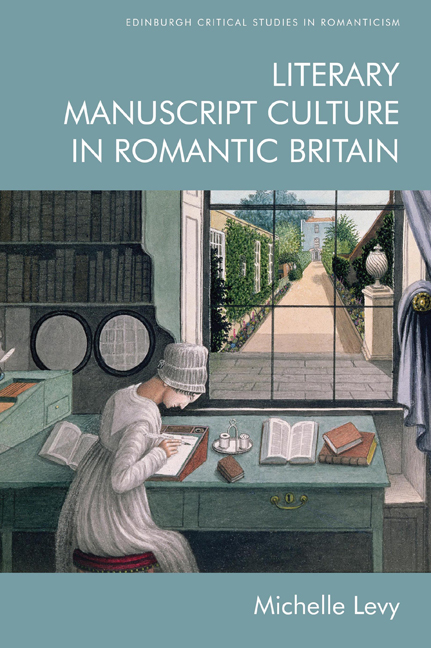Book contents
- Frontmatter
- Contents
- List of Illustrations
- Acknowledgements
- Dedication
- Introduction
- 1 Intentionality and the Romantic Literary Manuscript
- 2 Literary Reviews and the Reception of Manuscript Culture
- 3 Anna Barbauld’s Poetic Career in Script and Print
- 4 Lord Byron, Manuscript Poet
- 5 Jane Austen’s Fiction in Manuscript
- 6 Script’s Afterlives
- Afterword: Blake’s Digitised Printed Script
- References
- Index
- Plate Section
2 - Literary Reviews and the Reception of Manuscript Culture
Published online by Cambridge University Press: 08 October 2020
- Frontmatter
- Contents
- List of Illustrations
- Acknowledgements
- Dedication
- Introduction
- 1 Intentionality and the Romantic Literary Manuscript
- 2 Literary Reviews and the Reception of Manuscript Culture
- 3 Anna Barbauld’s Poetic Career in Script and Print
- 4 Lord Byron, Manuscript Poet
- 5 Jane Austen’s Fiction in Manuscript
- 6 Script’s Afterlives
- Afterword: Blake’s Digitised Printed Script
- References
- Index
- Plate Section
Summary
The previous chapter has described how many literary manuscripts produced in the Romantic period occupied a middle ground, serving as instruments of sociability and as potentially commercially objects, often both at once. As we have seen from the examples of Charlotte Smith and Dorothy Wordsworth, no one involved in writing and exchanging handwritten documents, even in private forms like letters and journals, could be unaware of their possible passage into print. Undoubtedly, given the expanding print marketplace, increasing numbers of literary works were written directly for print. Likewise, many literary manuscripts were produced without any explicit thought of print. But between these two extremes was a broad continuum that consisted of literary works for which, as the previous chapter has shown, intentionality regarding publication was uncertain or changeable. This chapter shifts attention more directly to the print marketplace, surveying the reception of printed literary works with ostensible social origins as a means of investigating the range of attitudes towards the rapid migration of literature from sociable manuscript to public print. This chapter turns to the literary reviews, influential institutions that reveal the contested nature of print, as some professional readers challenged the publication of certain writing deemed unsuitable for print. As we have seen in the Introduction, the Monthly Review derided Coleridge for collecting some of his poems in Sibylline Leaves, claiming that they were ‘more adapted to the silence and the privacy of domestic enjoyment, than to glaring and repulsive publication’. Similarly, in his review of Byron's first commercially published volume, Hours of Idleness, Henry Brougham, writing in the Edinburgh Review, speaking about the translations and other school exercises Byron had included, asked, ‘Only, why print them after they had their day and served their turn?’ The literary reviews became the battlegrounds that debated ‘the very identity of print’, to use Adrian Johns's phrase, and with it, prevailing concepts of manuscript writing and its proper bounds.
We find evidence for the disputed nature of print in the many explanations authors furnished for why they were printing their writing, a particularly common feature of works that originated in domestic and social circles. Charlotte Smith, as we have seen, claimed that she had to publish her sonnets to prevent ‘mutilated copies’ being printed by others.
- Type
- Chapter
- Information
- Literary Manuscript Culture in Romantic Britain , pp. 64 - 100Publisher: Edinburgh University PressPrint publication year: 2020



